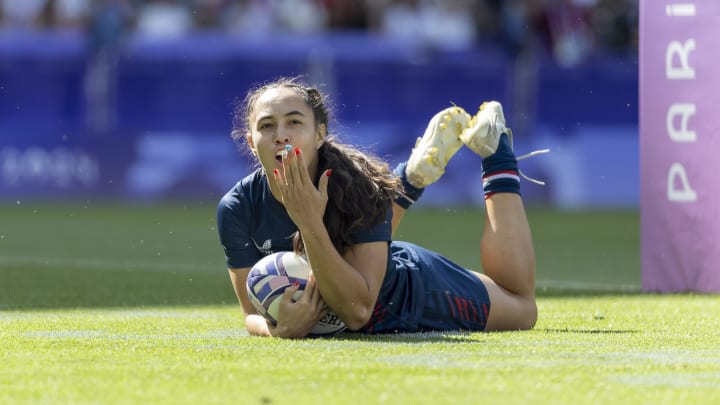U.S. Women Win First-Ever Rugby Sevens Olympic Medal With Last-Second Comeback

SAINT-DENIS, France — For the plucky, talented, unexpected force that is the U.S. women’s rugby sevens side, history at these Olympics would not be made until the final seconds of the bronze medal match on Tuesday.
In the semifinals, the U.S. met New Zealand, a dominant rugby dynasty—the Black Ferns Sevens have two World Cup titles, seven Women’s Rugby Seven Series championships, four Oceania Women’s Seven Series titles and two Olympic gold medals. The U.S. was defeated 24–12, but this set up a bronze medal match with Australia, the world’s other perpetually dominant side who won the sport’s first-ever Olympic gold medal in their sport eight years ago in Rio. The U.S. would either go home with a medal, or with nothing.
With just under a minute and a half left, the Aussies morphed a 7–7 tie into a 12–7 lead and the 2016 champions looked like they had sealed the match. Australia had the momentum and pinned the Americans deep on their end of the field, almost like a schoolyard, with an overmatched kid being pushed back by a bigger bully.
HISTORY🥉
— USA Rugby (@USARugby) July 30, 2024
The first ever USA medal in rugby sevens.
Congrats to this incredible team 👏 pic.twitter.com/UhuJtX6aB3
But with eight seconds remaining, 27-year-old Alex Sedrick—a Salt Lake City native nicknamed Spiff—caught a pass. A multi-sport athlete who settled on rugby, she sped toward the spiffiest achievement of her life. She sprinted 10 yards, tunneling through a hole in Australia’s defense, and then 20, 30, 40 more yards. Her sprint was more like what Noah Lyles and Sha’Carri Richardson plan to do this weekend on the track. Sedrick kept running and running and scored as time expired. Then she made the conversion that tipped the game—and the bronze medal—to the U.S. side.
Her Eagles teammates could hardly believe what they had witnessed. Jaws dropped. Benches emptied. The stadium, loud and festive all afternoon, produced a roar they must have heard all the way in Monaco. There were sprints. Piles of players. More than a few tears.
“It takes a lot to get here,” teammate Ariana Ramsey said after the match. “We were channeling frustration from Tokyo. I didn’t want to feel like that again.”
With the bronze, the U.S. earned its first medal in this event on Tuesday, as the women’s rugby sevens side had never before finished higher than fifth. The French crowd even turned toward the Americans over the course of the afternoon and early evening. How could they not?
